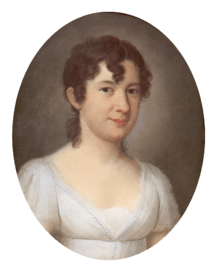Gingo biloba
Gingo biloba (later: Ginkgo biloba) is a poem written by the German poet Johann Wolfgang von Goethe. The poem was published in his work West-östlicher Diwan (West-Eastern Divan), first published in 1819. In his work he changed "Ginkgo" into "Gingo" for literary reasons.

Goethe sent Marianne von Willemer (1784-1860), the wife of the Frankfurt banker Johann Jakob von Willemer (1760-1838), a Ginkgo leaf as a symbol of friendship and on September 15, 1815 he read his draft of the poem to her and friends. On September 23, 1815 he saw Marianne for the last time. Then he showed her the Ginkgo tree in the garden of Heidelberg Castle from which he took the two leaves pasted onto the poem. After that he wrote the poem and sent it to Marianne on September 27, 1815.
Directly across from the Ginkgo tree stands the Goethe memorial tablet. The poem was published later as „Suleika“ in West-östlicher Diwan.

Rough English translation:
- Gingo Biloba
- This leaf from a tree in the East,
- Has been given to my garden.
- It reveals a certain secret,
- Which pleases me and thoughtful people.
- Is it a living being,
- Which has separated in itself?
- Or are these two, who chose
- To be recognized as one?
- Answering this kind of question,
- Haven't I found the proper meaning,
- Don't you feel in my songs,
- That I'm one and double?
The letter containing this poem with which Goethe included two Ginkgo leaves can be viewed in the Goethe Museum in Düsseldorf. The Ginkgo (planted in 1795) that Goethe led Marianne von Willemer to in September 1815 is no longer standing today. After 1928 the Ginkgo tree in the castle garden was labelled as "the same tree that inspired Goethe to create his fine poem". The tree was probably still standing in 1936.
| |||||||||||||||||||||||||||||